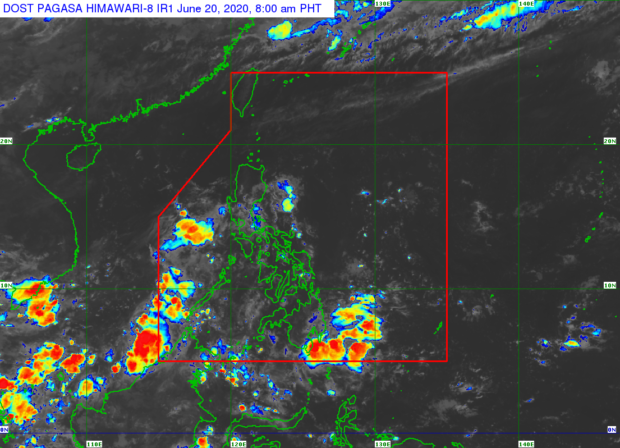Pagasa: LPA spotted east of Luzon but unlikely to become storm

Source: Pagasa website | 06:50 pm, June 02
MANILA, Philippines — The state weather bureau said Tuesday that it has detected a low-pressure area (LPA) within the Philippine area of responsibility, specifically east of Luzon, although it may dissipate in 24 to 36 hours.
The Philippine Atmospheric, Geophysical and Astronomical Services Administration (Pagasa) said the LPA was located 690 kilometers east of Casiguran in Aurora. It also said the LPA is not expected to turn into a Tropical Depression.
Pagasa likewise noted that the LPA has no direct effect in the country’s weather for now as atmospheric conditions will remain hot and humid for most of the country except for Palawan and Western Visayas as well as Mindanao, which may experience rain due to clouds within the intertropical convergence zone (ITCZ), on Wednesday.
Weather experts nevertheless said there is still a high chance of thunderstorms that may cause light isolated rains, lasting from one to two hours, by Wednesday afternoon and night.
Temperatures in Metro Manila are expected to reach around 25 to 35 degrees Celsius on Wednesday while hot weather will persist in Tuguegarao probably ranging from 26 to 37 degrees Celsius.
Article continues after this advertisementThe same weather situation may be experienced for the rest of Visayas and Mindanao, with temperatures hitting 26 to 33 degrees Celsius in Cebu and 25 to 33 degrees Celsius in Davao.
Article continues after this advertisementPagasa also released a list of highest-recorded actual temperatures on Monday from its different weather stations with Tuguegarao topping the list at 36.9 degrees Celsius, followed by Camiling in Tarlac and Echague in Isabela with 36.7 degrees Celsius, Hacienda Luisita also in Tarlac at 36.3 degrees Celsius, and Guiuan in Eastern Samar at 36 degrees Celsius.
Meanwhile, no gale warning has been raised as sea conditions all over the country will be slight to moderate, according to Pagasa. This means that fisherfolk could set sail Wednesday. However, the western seas may see higher waves when thunderstorms caused by the ITCZ occur.